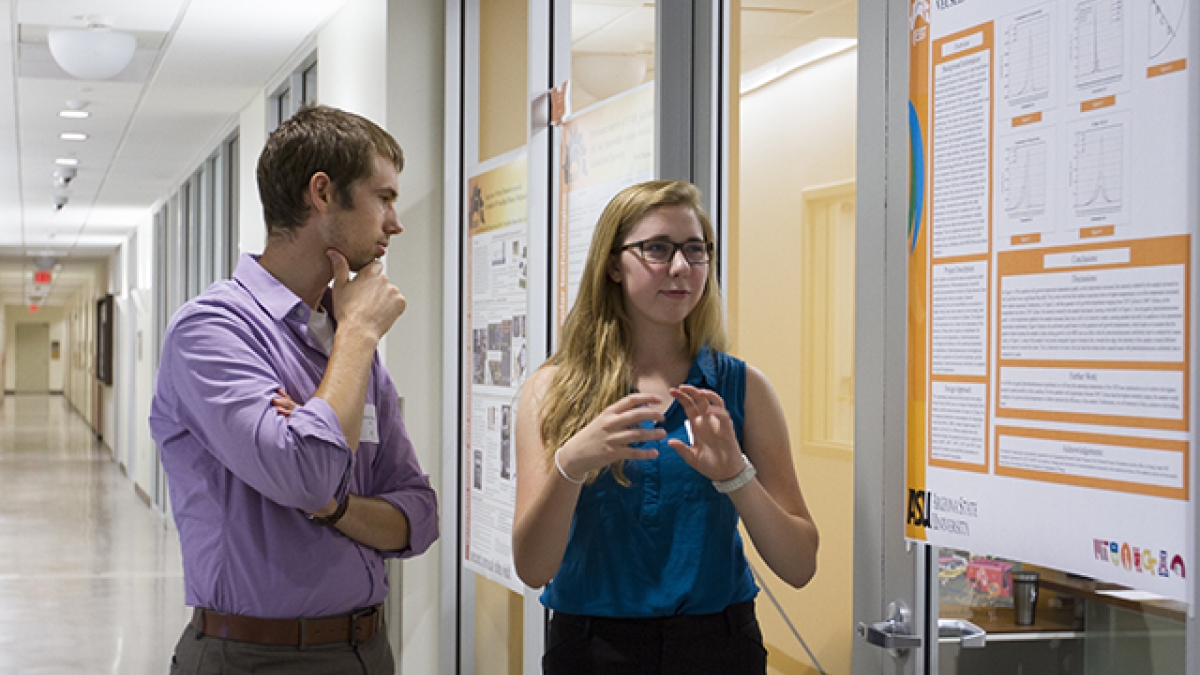NSF-funded site at ASU looks to inspire next generation of bright researchers

Cailin Treseder, a University of New Mexico student with a Research Experiences for Undergraduates pilot program, presents her research to assistant professor Zachary Holman in the summer of 2013. Holman was recently awarded a three-year grant from the National Science Foundation to establish an REU site at ASU. In addition to providing research opportunities for students, one focus of the program is to encourage students to learn how to present and explain their findings. “It’s vital for researchers to be able to communicate their work,” said Holman. Photographer: Qiudi Zhang/ASU
Thanks to a recent award from the National Science Foundation (NSF), Arizona State University’s Ira A. Fulton Schools of Engineering have established a program to search seldom-tapped talent pools of students to work on another untapped resource: solar power.
The three-year, $314,261 award will fund an annual summer program aimed at exposing undergraduate students to research opportunities to which they might not otherwise have access. Research Experiences for Undergraduates (REU) Site: Solar Energy Research for the Terrawatt Challenge is a program planned to host eight students a session. It will incorporate workshops, seminars and hands-on research experience that culminate in participating students traveling to a conference to present their work.
Assistant professor of electrical engineering Zachary Holman, the principal investigator on the award, said he’s excited to develop a pipeline for talented students to learn about research and the possibilities of solar power.
“For one, we need more people and good researchers working in solar,” said Holman, a faculty member in the School of Electrical, Computer and Energy Engineering. “Two, in my experience, I don’t know if I like something until I try it. This gives students an opportunity to try something they might otherwise not.”
The first session of the REU site is slated to run from May 31 to July 29 and will be based in the facilities of the Quantum Energy and Sustainable Solar Technologies (QESST) Engineering Research Center, funded by the NSF and Department of Energy.
During the nine-week course, students will research existing solar cell technologies and develop new solar materials and devices. In addition to experiencing research, the students will cultivate skills essential to succeeding in academia, such as collaboration and communication. Students will be assigned partners with different experiences and backgrounds to encourage problem solving from multiple perspectives, said Holman.
Holman stresses the importance of not only providing research opportunities, but teaching students to relate their findings.
“It’s vital for researchers to be able to communicate their work,” says Holman. “Be that with peers, parents or the research community at large when we send them to a conference.”
A product of the REU program himself, Holman credits his own research experience as an undergraduate for setting him on the path he’s on today. As a physics undergraduate student at Reed College in Portland, Oregon — a small liberal arts school — Holman did not have access to research.
He participated in two REU sites: at the University of Idaho and the University of Minnesota. While in Minnesota, he headed his own project working on diesel engine exhaust and particulate matter. As a result, Holman switched his major to mechanical engineering and later returned to the University of Minnesota for graduate school.
“A goal of the program is to repeat what happened to me,” said Holman. “We want students to come to ASU, conduct research and have an experience that transforms their careers.”
Prior to receiving this award, ASU has already seen success with REU site pilot programs run by QESST since 2012. These pilot programs established the cohort-focused model of the REU site and contributed to the structure of the proposal for the award, according to Jenefer Husman, Education Director of QESST.
“Over the past four years we have had 30 students participate in the REU pilot program,” said Husman, also an associate professor in the Sanford School of Social and Family Dynamics in the College of Liberal Arts and Sciences. “Of those students 100 percent have remained in engineering after leaving our program. We have had eight community college students; of those six have gone on to pursue university degrees in engineering, two completed their certificates in solar energy and now work in the solar energy industry.”
Husman will continue to advise on the curriculum of the program going forward.
Holman and co-principal investigator Trevor Thornton look forward to bringing the next cohort of students to ASU to further solar research and make their mark.
"Having an NSF-funded REU site at ASU allows us to build a community of impassioned students who want to make a difference in the world,” said Thornton, a professor of electrical engineering.
Learn more about the REU site program and the other sites across the nation.
More Science and technology

ASU professor wins NIH Director’s New Innovator Award for research linking gene function to brain structure
Life experiences alter us in many ways, including how we act and our mental and physical health. What we go through can even…

ASU postdoctoral researcher leads initiative to support graduate student mental health
Olivia Davis had firsthand experience with anxiety and OCD before she entered grad school. Then, during the pandemic and as a…

ASU graduate student researching interplay between family dynamics, ADHD
The symptoms of attention deficit hyperactivity disorder (ADHD) — which include daydreaming, making careless mistakes or taking…